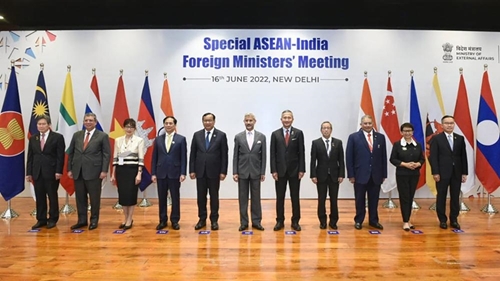The Vietnamese FM suggested ASEAN and India bring into play their shared values, enhance dialogues, cooperation and trust building, and work to limit differences and conflicts, thus actively contributing to peace, stability and development in the region.
    |
 |
|
Delegates pose for a group photo at the meeting. (Photo: Twitter of Indian Minister of External Affairs Subrahmanyam Jaishankar) |
He suggested the two sides further support each other to improve medical capability, effectively carry out ASEAN-India free trade agreement, expand cooperation in digital transformation and innovation as well.
The Vietnamese diplomat also asked India to back ASEAN’s efforts to build the East Sea (internationally South China Sea) into peaceful, stable, cooperative, and environmentally-friendly waters, making active contribution to the regional and international peace, security and prosperous development.
On the sidelines of the meeting, FM Bui Thanh Son had bilateral meetings with his Indonesian and Bruneian counterparts Retno Marsudi and Dato Erywan Pehin Yusof, respectively.
The Special ASEAN-India Foreign Ministers’ Meeting opened on June 16. This is the first time India has hosted such a special meeting on the occasion of the 30th anniversary of ASEAN-India partnership and 10th anniversary of ASEAN-India strategic partnership.
Indian Minister of External Affairs Subrahmanyam Jaishankar and his Singaporean counterpart Vivian Balakrishnan co-chaired the meeting.
In his opening remarks, Indian Minister of External Affairs Subrahmanyam Jaishankar underscored that the enhancement of the strategic partnership between ASEAN and India will help promote decentralized globalization, and create flexible and reliable supply chains.
The Indian senior official said that India fully supports a strong, united and prosperous ASEAN, and an ASEAN with a central role in the Indo-Pacific.
Earlier, in a press conference, the spokesman of the Indian Ministry of External Affairs Arindam Bagchi stressed that the ASEAN-India strategic partnership is reaching maturity and is built on a strong foundation. Bagchi’s saying was quoted by Hindustan Times.
For a long time, India and ASEAN have shared similar stance on international issues. At this meeting, senior officials of the two sides reviewed their cooperation according to the three pillars of the partnership, including political affairs, security, and socio-economy. They also discussed steps to further implement the ASEAN-India action plan for the 2021-2025 period. The two sides also exchanged views on regional and international issues of common concern, including the COVID-19 crisis and post-pandemic recovery.
According to the Indian senior official, the COVID-19 pandemic is not completely over and the post-pandemic recovery road is still rocky. He said that this road has become even more arduous due to geopolitical difficulties both sides are facing, caused by developments in Ukraine and their direct impact on food and energy security, escalation of fertilizer and commodity prices, along with supply chain disruptions.
Singaporean Minister of Foreign Affairs Balakrishnan said that apart from Russia-Ukraine conflict, the increasingly-fierce competition between the two superpowers the U.S. and China has directly impacted all of us. Therefore, if these issues are not be controlled, they could threaten our entire system of peace and stability, which has been the foundation of growth, development and prosperity for decades.
The Singaporean senior officials hoped that the meeting is an opportunity for ASEAN and India to strengthen linkages and build capacity to cope with current and future challenges.
Regarding ASEAN’s position and role in the region, Indian Minister of External Affairs Jaishankar described ASEAN a lighthouse of regionalism, multilateralism and globalization. He said that ASEAN has established itself an important position in the region and built a foundation of economic structure and development strategy in the Indo-Pacific region. He noted that ASEAN’s today’s role is probably more important than ever, given the challenges and geopolitical uncertainties facing the world. He added that the strong convergence between the ASEAN Outlook on the Indo-Pacific (AOIP) and the Indo-Pacific Oceans Initiative (IPOI) are testaments to the two sides’ shared vision for the region.
India and ASEAN established their partnership in 1992 and upgraded their relations to strategic partnership in 2012. Despite COVID-19-caused difficulties, the two sides’ trade cooperation has increased rapidly in recent years, with bilateral trade increasing from USD 5.8 billion in 1996 to USD 84.39 billion in 2021.
However, in comparison with the ASEAN-China trade, this figure is still modest because since 2009, Beijing has remained ASEAN’s largest trading partner, with two-way trade reaching nearly USD 878 billion in 2021.
In order to strengthen its influence in the region, India will need to bolster its economic cooperation with ASEAN countries. However, India is at a disadvantageous position because it does not join in the Regional Comprehensive Economic Partnership (RCEP) which sees the engagement of 10 ASEAN member countries and five other countries including China, Japan, the Republic of Korea, Australia, and New Zealand.
2022 is the ASEAN-India Friendship Year. The strategic partnership between ASEAN and India has become one of ASEAN's fastest growing, most dynamic and comprehensive relationships.
According to political analysts, the Special ASEAN-India Foreign Ministers’ Meeting is a rare chance for ASEAN and India to elevate their relations to a comprehensive strategic partnership in the context that the world and region are still at risks of conflicts and instability that cannot be resolved overnight.
Translated by Mai Huong